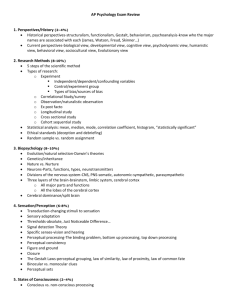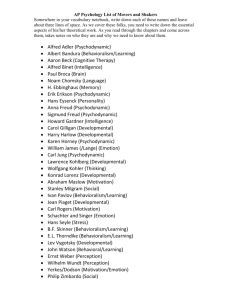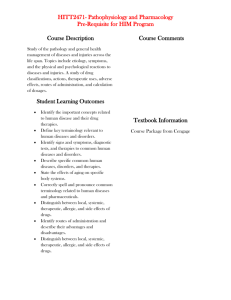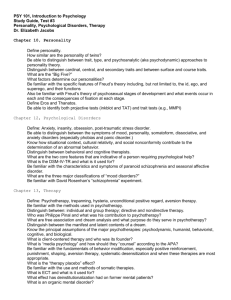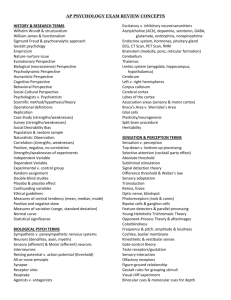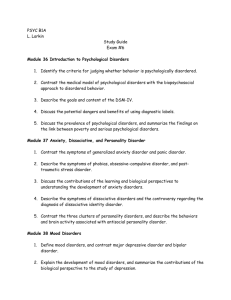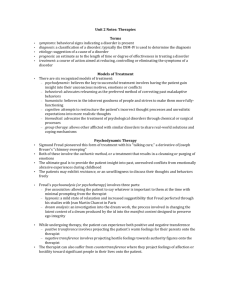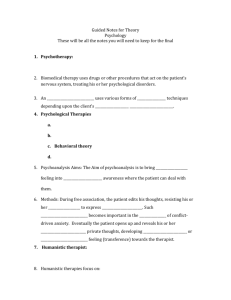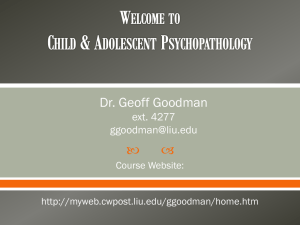AP Psych review Packet
advertisement
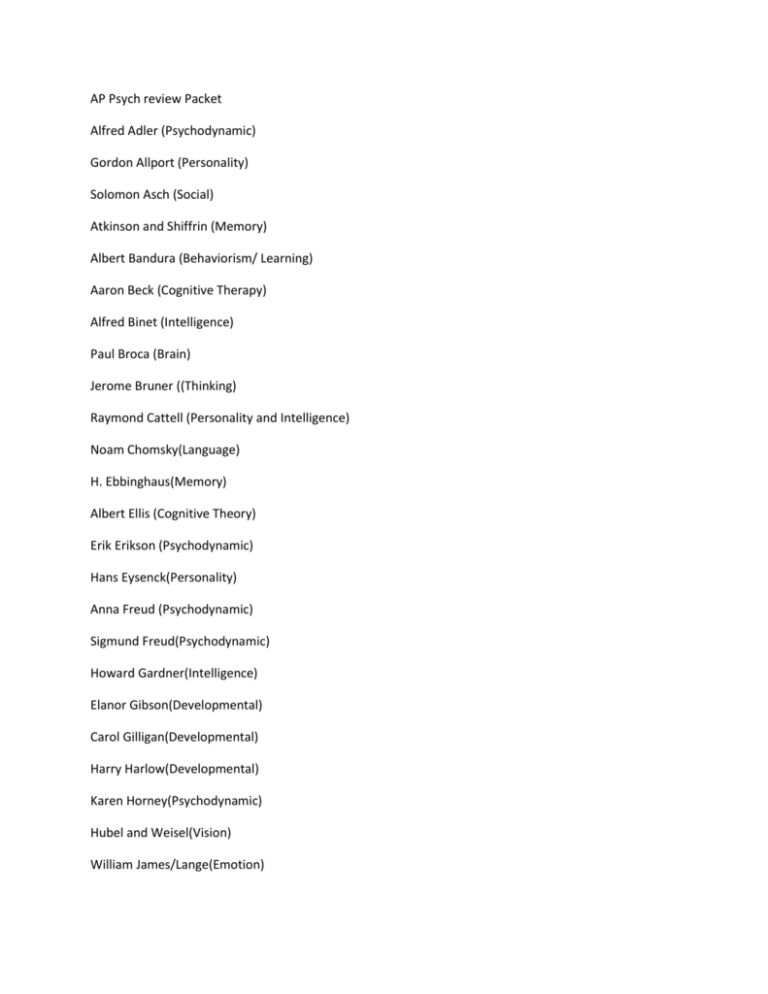
AP Psych review Packet Alfred Adler (Psychodynamic) Gordon Allport (Personality) Solomon Asch (Social) Atkinson and Shiffrin (Memory) Albert Bandura (Behaviorism/ Learning) Aaron Beck (Cognitive Therapy) Alfred Binet (Intelligence) Paul Broca (Brain) Jerome Bruner ((Thinking) Raymond Cattell (Personality and Intelligence) Noam Chomsky(Language) H. Ebbinghaus(Memory) Albert Ellis (Cognitive Theory) Erik Erikson (Psychodynamic) Hans Eysenck(Personality) Anna Freud (Psychodynamic) Sigmund Freud(Psychodynamic) Howard Gardner(Intelligence) Elanor Gibson(Developmental) Carol Gilligan(Developmental) Harry Harlow(Developmental) Karen Horney(Psychodynamic) Hubel and Weisel(Vision) William James/Lange(Emotion) Irving Janis(Social) Carl Jung(Psychodynamic) Lawrence Kohlberg(Developmental) Wolfgang Kohler(Thinking) Richard Lazarus(Therapy) Kurt Lewin(Social) Konrad Lorenz(Developmental) Abraham Maslow(Motivation) Stanley Milgram(Social) Ivan Pavlov(Behavioralism/Learning) Jean Piaget(Developmental) Carl Rogers(Motivation) Schacter and Singer(Emotion) Hans Seyle(Stress) B.F. Skinner(Behavioralism/Learning) Roger Spearman(Intelligence) Roger Sperry(Brain) Robert Sternberg(Intelligence) Edward Tolman(Cognitive/Learning) E.L. Thorndike(Behavioralism/Learning) Lev Vygotsky(Developmental) John Watson(Behavioralism/Learning) Ernst Weber(Perception) Wilhelm Wundt(Perception) Benjamin Whorf(Language) Yerkes/Dodson(Motivation/Emotion) Philip Zimbardo(Social) Topics 1. Perspectives/History Historical Perspectives: Structuralism,functionalism, Gestalt, behaviorism, psychoanalysis-know who the major names are associated with each. Current Perspectives-Biological View, Developmental View, cognitive view, psychodynamic view, humanistic view, behavioral view, sociocultural view, evolutionary view. 2. Research Methods 5 Steps of the Scientific Method Types of research: -Experiment -Independent/dependent/confounding variables -Control/experiment group -Types of bias/sources of bias -Correlational Study/Survey -Observation/Naturalistic Observation -Ex post facto -Longitudinal Study -Cross sectional study -Cohort sequential study Statistical Analysis: mean, median, mode, correlation coefficient,histogram, “Statistically Significant” Ethical standards(Deception and debriefing) Random Sample vs. random assignment 3. Biopsychology Evolution/natural selection-Darwin’s theories Genetics/inheritance Nature vs. Nurture Neurons-parts, functions, types, neurotransmitters Divisions of the nervous system-CNS, PNS-somatic, autonomic-sympathetic,parasympathetic Three Layers of the brain-brainstem,limbic system, cerebral cortex -All Major parts and functions -All lobes of the cerebral cortex Cerebral Dominance/split brain 4. Sensation/Perception Transduction-changing stimuli to sensation Sensory adaption Thresholds-Absolute, Just Noticeable difference Signal Detection Theory Specific Senses-Vision and hearing Perceptual processing-The binding problem. Bottom up processing, top down processing Perceptual consistency Figure and Ground Closure The Gestalt Laws-perceptual grouping, law of similarity, law of proximity, law of common fate Binocular vs. Monocular Clues Perceptual Sets 5. States of Consciousness Conscious vs. Non-Conscious processing Levels of non-conscious mind Sleep: Circadian Rhythms, REM vs. N-REM, Sleep stages, sleep paralysis Dreams-Current theories vs. Freudian Theories -Manifest content vs. Latent Content Hypnosis Psychoactive Drugs 6. Learning Learning vs. Instinct Simple and Complex Learning Ivan Pavolv Classical Conditioning -Neutral Stimulus -Acquisition -UCS/CS/UCR/CR -Extinction -Discrimination -Spontaneous Recovery Operant Conditioning -Law of effect -Reinforce-positive and negative reinforcement -Punishment-Negative and positive punishment -B.F. Skinner -Schedules of reinforcement-Continuous vs. intermittent, ratio vs. interval -Shaping -Primary vs. Secondary Reinforcers -Token Economy Wolfgang Kohler-Study with Chimps Cognitive Maps Latent Learning Observational Learning-Bobo doll experiment 7. Cognition Memory -3 basic processes/information processing model: encoding, storage, retrieval -Eidetic Memory -Sensory Memory -Working Memory -Long-term memory -Chunking,rehearsal -Levels of processing theory -Declarative Memory -Episodic Memory -Procedural Memory -Semantic Memory -Engram -Anterograde Amnesia, retrograde amnesia -Flashbulb Memory -Implicit vs. Explicit Memory -Priming -Recall vs. recognition -Mood-memory congruent -Schacter’s Seven Sins of Memory -Transience -Absent Mindedness -Blocking -Proactive Interference/retroactive Interference/serial position effect -Misattribution -Suggestibility -Bias -Persistence Language Structures of the Brain-LAD Acquiring Vocabulary 8. Emotion and Motivation Plutchik’s Emotion Wheel Neuroscience of Emotion-Role of limbic system(amygdala, hippocampus, reticular formation, cerebral cortex) James-Lange Theory vs. Cannon-Bard Theory Two-Factor Theory Opponent-Process Theory The inverted U/Yerkes Dodson Model Types of motivation-Intrinsic vs. Extrinsic Motivation Theories of Motivation -Instinct Theory -Drive Theory -Cognitive Theory of Loci -Freud’s Theory of Psychoanalysis -Maslow’s Hierarchy of Needs Stress vs. Stressor Traumatic Stressors/PTSD -5 stages of recovery Physical Response to stress, Fight or Flight General Adaption Syndrome Type A/Type B Patterns 9. Psychological Development Fraternal/Identical Twins Continuity View of Development Discontinuity view of development Prenatal Development -Prenatal Period, Teratogens Neonatal period Infancy Attachment Imprinting Contact comfort -Harry Harlow’s study with monkeys Maturation Cognitive Development/Piaget -Schemas, Assimilation/accommodation -Piaget’s stages of development -Sensorimotor -Preoperational -Egocentrism -Animistic Thinking -Centration -Irreversibility -Concrete Operational -Formal Operational Theory of Mind Zone of Proximal development 4 distinct parenting styles Erikson’s Thepry of Psychosocial Development Kohlberg’s Stages of Moral Reasoning Development challenges of adults 10. Personality Freud’s Psychodynamic Theory of Personality(Iceberg Model) -Id -Ego -Superego -Unconscious -Libido -Oedipus Complex -Defense Mechanisms -Repression -Rorschach Inkblot Tests Carl Jung -Personal unconscious/collective unconscious Humanistic Theories -Abraham Maslow-Self actualizing personalities -Carl Rogers-Fully functioning person Locus of Control-Rotter’s Theory The “Big Five” Traits/The Five-Factory Theory 11. Testing and Individual Difference Validity Reliability Face Validity Content Validity Item analysis Standardized Test Split-Half reliability IQ Objective tests Subjective Tests Inter-Rater reliability Sternberg’s Triarchic Theory Gardner’s Multiple Intelligences -Linguistic Intelligence, logical-mathematical intelligence, spatial intelligence, musical intelligence, bodily kinesthetic intelligence, intrapersonal intelligence 12. Psychological Disorders Psychopathology -Hallucinations -Delusions -Affect Hippocrates Humor Theory History of how Psychological disorders were treated Indicators of abnormality -Distress -Maladaptiveness -Irrationality -Unpredictability -Unconventionality/Undesirable Behavior DSM-IV-TR Mood Disorders Cognitive-behavioral Cycle of depression -major Depression, Bipolar Disorder Anxiety Disorders -Generalized Anxiety Disorder, Panic Disorder, Phobic Disorders, Obsessive-Compulsive Disorder Somatoform Disorders -Conversion Disorder, Hypochondriasis Dissociative Disorders -Dissociative Amnesia, Dissociative Fugue, Depersonalized Disorder, Dissociative Identity Disorder Eating Disorders Schizophrenia -Major Types of Scizophrenia: Disorganized, catatonic, paranoid, undifferentiated, residual -Causes of Schizophrenia Personality Disorders -Narcissistic Personality Disorder, Antisocial Personality Disorder Developmental Disorders -Autism, dyslexia 13. Therapies for Psychological Disorders Insight Therapies Talk Therapies Psychoanalysis: Analysis of transference Neo-Freudian Psychodynamic Therapies Humanistic Therapies:Client-Centered Therapy Cognitive Therapies Group Therapies Group Therapies/Self-Help Support Groups Behavior Therapies -Behavior Modification -Classical Conditioning Therapies -Systematic Desensitization -Aversion therapy -Exposure Therapy -Operant Conditioning Therapies-Token Economies Cognitive Behavioral Therapy -Rational-Emotional Behavior Therapy Drug Therapies -antipsychotic drugs -Antidepressants -Mood Stabilizers -Antianxiety -Stimulants Brain Stimulation Therapes 14. Social Psychology Social Context Social reality Social Roles Social Norms Conformity -Asch effect -Group-think factors that promote group think Milgram’s Obedience Experiment -Why we obey authority The Bystander Problem -Kitty Genovese -Diffusion of Responsibility Reward Theory of Attraction -Proximity -Similarity -Self-disclosure -Physical Attractiveness Matching Hypothesis Expectancy-Value Theory Cognitive Dissonance Fundamental attrition error Self-Serving Bias 5 cases of Prejudice -Dissimilarity and social distance -Economic Competition -Scapegoating -Conformity to social Norm -Media Stereotypes Social facilitation Social Loafing Deindividualization Group Polarization Groupthink
